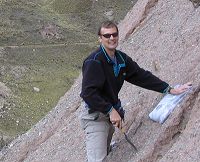Aufdenkampe honored for outstanding service to water sciences community
Anthony Aufdenkampe, Ph.D., a specialist in organic and isotope geochemistry at Stroud Water Research Center, received the Outstanding Service Award from the Consortium of Universities for the Advancement of Hydrologic Science, Inc. (CUAHSI).
The award was presented to Aufdenkampe “in recognition of his outstanding vision and leadership in the development of critical zone science and contributions to cyberinfrastructure.” The presentation was made July 29, during the CUAHSI biannual symposium in Shepherdstown, West Virginia. The nonprofit research organization represents more than 100 U.S.-based universities and international water science organizations. The award is conferred to two individuals every two years.
"Anthony has generously contributed to science, education, and community building efforts both across and outside of the Critical Zone Observatory (CZO) Network,” said Brian McGlynn, Ph.D., professor of watershed hydrology and biogeosciences at Duke University and member of the CUAHSI Board of Directors.
Aufdenkampe served as the national chairman of the CZO network between May 2012 and July 2013, oversaw the development and launch of the national CZO website (http://criticalzone.org), co-organized the first international CZO meeting in 2011 and organized the first international CZO data integration meeting in 2013, both at the University of Delaware. He currently leads the network’s national data integration initiative.
“It’s not often that a researcher is recognized for his selfless service to the scientific community,” said Bernard W. Sweeney, Ph.D., director of Stroud Water Research Center. “I’m proud and happy that CUAHSI honored Anthony this way. I can’t think of anyone more deserving.”
The critical zone is the zone on the earth’s surface that makes life possible—loosely described as “where rock meets life.” The Critical Zone Observatory is a national research project sponsored by the National Science Foundation in which an interdisciplinary team of scientists study the earth’s outer skin in designated environmental observatories in different regions, each with its own distinct climate, rocks, soils, and plants. These include: the Boulder Creek CZO in Colorado; the Calhoun CZO in South Carolina; the Christina River basin CZO in Delaware, Pennsylvania and Maryland; the Santa Catalina Mountains & Jemez River Basin CZO in New Mexico and Arizona; the Eel River CZO in California; the Intensively Managed Landscapes CZO in Illinois, Iowa & Minnesota; the Luquillo CZO in Puerto Rico; the Southern Sierra CZO in California; the Reynolds Creek CZO in Idaho; and the Susquehanna Shale Hills CZO in Pennsylvania. CUAHSI is one of 15 CZO primary partner organizations.
Aufdenkampe leads the research team studying the Christina River basin CZO, recognized as a model in the CZO community for integrated, multidisciplinary research questions, innovative environmental sensing technologies and a focus on sustainable land use.
His research focuses on measuring the role of river systems in regional and global carbon cycles and understanding how interactions between organic carbon and minerals change the makeup and movement of organic matter in water and soil.
Aufdenkampe earned his doctorate and master’s degrees in chemical oceanography at the University of Washington in Seattle and graduated cum Laude with a B.A. in chemistry from Dartmouth College in Hanover, New Hampshire. He lives with his wife, Bonnie, and their three children in London Grove Township.
News Category:
PEOPLE |
AWARD |
EDUCATION/OUTREACH
Discipline Tags and CZOs
All Disciplines
Data Management / CyberInfrastructure
Outreach / Education Research
National
Christina
Explore Further



